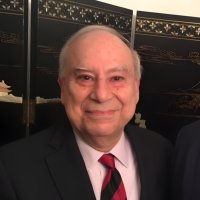Suspended Somewhere Between
Special guests joined Akbar Ahmed in reading selections from his book of poetry, Suspended Somewhere Between, and provided commentary on the context and content of these poems.
On July 28, Outreach and Communication and the Middle East Program of the Woodrow Wilson Center presented a book launch and poetry reading as part of the Wilson Forum Series, “Suspended Somewhere Between,” with Akbar Ahmed, Ibn Khaldun Chair of Islamic Studies at American University and former Ambassador of Pakistan to the UK, and Farzaneh Milani, Professor of Persian Literature and Women’s Studies and Chair of the Department of Middle Eastern and South Asian Languages and Cultures at the University of Virginia. John Milewski, Managing Editor and Host, Dialogue, Woodrow Wilson Center, moderated the event. Haleh Esfandiari, Director of the Middle East Program at the Woodrow Wilson Center, provided introductory remarks.
In a conversational setting in which questions and comments from the audience were encouraged throughout, Ahmed and special guests presented six of his poems. According to Ahmed, the collection of poetry in Suspended Somewhere Between was written over decades, in English, for his own personal intellectual value and development. The title of the book, he said, was not about being caught between religions or cultures, but about humanity’s movement into the 21st century, balancing a “quest for serenity” with a “desire for the material.” Milani praised the collection for providing a different, more persistent perspective on the world than usual books of political science and history do, further suggesting that more diplomats should write poetry.
Ahmed began the reading with the poem “To my mother,” which emphasized the role of family in his life, as did the poem “for Umar, with love,” read by special guest Rev. Carol Flett. Other themes made prominent by the selections were that of Sufism and the continuity of nature, both evoked by the poems “sufic slants,” read by Farzaneh Milani, and “At the Khaibar Pass,” read by special guest Fauzia Kasuri. Sally Quinn, founder and editor-in-chief of the Washington Post blog On Faith, commented from the audience on the latter poem, highlighting its portrayal of the “ephemeral nature of war” and suggesting that American politicians learn to appreciate the permanence of nature instead. Ahmed also felt that “poetry is not poetry unless it is brutally honest.” A harrowing example of this was evident in “they are taking them away,” a poem inspired by the violence surrounding the split of Pakistan and Bangladesh in 1971 and read by special guest Rabbi Noah Fabricant. Rounding out the discussion, Wilson Center President, Director, and CEO Jane Harman presented a pre-recorded reading of “What is it that I seek?” – a poem that reflects Ahmed’s philosophical models and illustrates the value he places on both intellect and emotion.
By Laura Rostad, Middle East Program
Speakers

Distinguished Professor and Ibn Khaldun Chair of Islamic Studies, School of International Service, American University; Former Pakistan High Commissioner to the United Kingdom and Ireland

Hosted By

Middle East Program
The Wilson Center’s Middle East Program serves as a crucial resource for the policymaking community and beyond, providing analyses and research that helps inform US foreign policymaking, stimulates public debate, and expands knowledge about issues in the wider Middle East and North Africa (MENA) region. Read more
